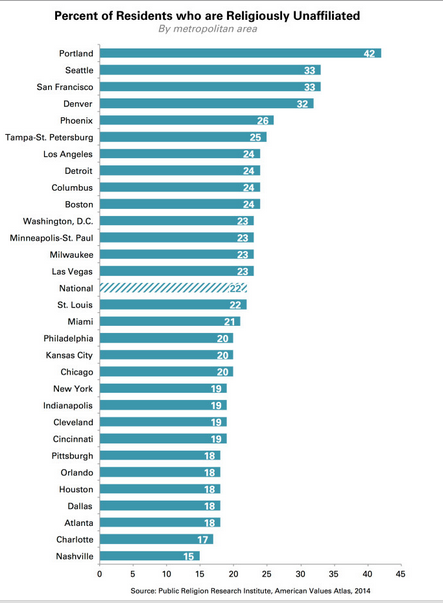
This is the Least Religiously Affiliated State in America
- By Gary Nguyen --
- 31 Aug 2015 --

37% of Oregon residents say they are unaffiliated with any religious group, but has the highest percentage of Evangelical Christians in the country.
Oregon consistently ranks as the most religiously-unaffiliated state in the United States. In the recent survey conducted by the Public Religion Research Institute (PRRI), the percentage of residents that says they are unaffiliated with any religious group is at 37%. This is despite a data showing that the state has the highest percentage of Evangelical Christians in the country. As a result, almost all religions in the state are suffering from membership decline and hardships in raising money.
But notwithstanding this rising trend of unreligious residents, the majority of the surveyed individuals do believe that religion plays an important role in their daily lives. In terms of membership, the largest religious groups include Catholics, Protestants (including its denominations), Mormons and Buddhists.
Aside from being the most unreligious state, the Oregon city of Portland is also considered the top ranker for the same category. 42% of Portland residents consider themselves as religiously-unaffiliated.
Understanding the reasons behind such trends
Several experts have studied and tried to analyze why such trend is happening in the Beaver State. And all the conclusions derived are somewhat unanimous. First, experts note that residents in the state are increasingly spiritual but unreligious.
Didn't realize Oregon had the highest proportion of religiously unaffiliated in the country: http://t.co/O12rKzRQYs Go Ducks.
— Casey Michel (@cjcmichel) March 13, 2015
Spirituality is an individual’s personal faith in the value of life, morals, good values, peace, and sense of purpose. Spirituality can be exercised without practicing and becoming a member of any particular religion. Dan Cox of the research institute explains that “most people who identify as unaffiliated believe in a higher power of some kind, but say belief in God isn’t necessary in order to be moral and have good values”.
Another reason identified is the growing number of young and liberal people. As Dr. Monica Miller of the Lewis & Clark Religious Studies cites “The minute you approach young people with a survey about religion, they’re immediately turned off, because that grammar doesn’t hold meaning for them.” But Dr. Miller adds that even if the youth are becoming less and less religious, they still believe in morals like the idea of giving and sharing. According to her, charity and other civic efforts became the replacement of religion among the youth.
Cox added that “They’re young, socially liberal and usually believe in evolution. Most are more concerned about religious groups asserting their beliefs on others than about the government limiting religious freedom.”
Experts also argued on Portland and Oregon’s culture of openness. According to Miller, progressive openness leads its residents to practice critical thinking whether it be politics, economics, culture, and even religion.



















